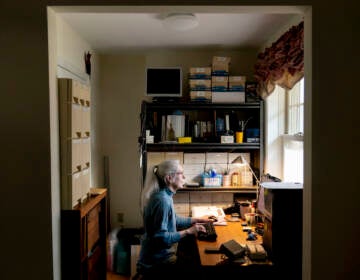Campaigning for more benefits from Comcast ahead of next franchise agreement

Later this year, City Council will begin a series of hearings on the city’s next 15-year franchise agreement with Comcast. The agreement, which expires this year, gives the company access to public streets and telephone poles, and in return, Comcast pays the city a “franchise fee” equal to 5 percent of its revenue from cable subscriptions.
For the past few months, there’s been an increasingly well-publicized campaign to negotiate an expanded set of public benefits from the company in exchange for access to city infrastructure. The campaign is called CAP Comcast—the CAP stands for “Corporate Accountability Project”—and it carries a growing list of possible demands the city could make in its upcoming franchise negotiations.
Of course, the city isn’t likely to deny Comcast access to the needed infrastructure altogether. It’s also not entirely clear how impactful Comcast’s use of streets and telephone poles really is. How much would the company be willing to give back in return for that access? And what leverage does the city really have in negotiating for more benefits?
For their part, Comcast officials weren’t willing to discuss how they’d approach negotiating the next franchise agreement. In a blog post, two Comcast executives wrote that they expect the negotiations with Philadelphia to be more public than negotiations elsewhere because the company is based here, but they emphasized that the company is proud of its current investment in the city.
To Hannah Sassaman, an organizer of the CAP Comcast campaign and policy director for the Media Mobilizing Project, this is a rare opportunity to publicly discuss what the city’s largest private company should provide—not just as an exchange for access to our public infrastructure, but as an accountable “corporate citizen.”
“This is the only time in the next 15 years that we actually get a public discussion,” Sassaman said recently. “… We have to use what political opportunities and negotiating opportunities we have.”
Last week, Mayor Michael Nutter released a report showing that more than a quarter of Comcast customers are unsatisfied with the service. Nutter has also said he’d help negotiate for more improvements. Newsworks has a good rundown of that report’s findings; on Billy Penn, a former Comcast executive says the report is “politics as usual” and that any expanded public benefits would simply add to the cost of Internet service for Comcast customers.
The CAP Comcast campaign, of course, is demanding that any increase in public benefits be paid for out of the company’s impressive profit margin, rather than passed on to customers through the cable bills. Below are a few of the campaign’s biggest demands.
EXPAND INTERNET ESSENTIALS
Internet Essentials is Comcast’s low-cost Internet service that’s available for low-income families, defined as households with at least one child who’s eligible for the National School Lunch Program. (Eligible households can earn incomes up to about $44,000 for a family of four; see the rest of the eligibility guidelines here.)
Families who sign up for the program can get Internet access for just $9.95 a month, or about a fifth of the normal cost for Internet-only service. The families are also eligible to buy a computer at the time of enrollment for $150. Comcast has reportedly enrolled 450,000 families in the program nationwide, and is touting the program in support of its efforts to merge with Time-Warner.
But in Philadelphia, Comcast’s hometown, Internet Essentials has reached just 15 percent of eligible households, according to the company, up from 9 percent last year. Some of the reasons for that include structural barriers to enrollment: current Comcast Internet subscribers, some people with overdue bills, and households without children are all ineligible for the program, for example.
CAP Comcast is seeking an expansion of the program and an improvement of Internet speeds. The group is also seeking subsidized service for families who can’t afford the $10-per-month program.
A spokeswoman for the company said that recent tweaks have made the Internet Essentials program more accessible, including a promotion, ending in May, that gives qualifying families six months of Internet for free. She said the point of the program is to enroll families who don’t have Internet access, and allowing current Internet subscribers to re-enroll in the lower-cost Internet Essentials program wouldn’t achieve that.
CONNECT SUBSIDIZED HOUSING
Another way Comcast could expand access to its Internet service for poor people is to connect all public subsidized housing in the city, according to the accountability project.
This effort could prove to be more difficult than expanding the Internet Essentials program, as subsidized housing is spread out across the city and across a variety of programs. That would include more than 14,000 units owned by the Philadelphia Housing Authority and 18,000 units subsidized through the Section 8 housing voucher program. It would also include various other sites owned by private developers but built with Low-Income Housing Tax Credits.
PROVIDE TECHNOLOGY FOR SCHOOLS
CAP Comcast argues that the cable company pays less than its fair share of taxes for public schools, benefiting from the ten-year property-tax abatement on its current and future towers and from $40 million in public subsidies for its new project.
For 2015, Comcast will owe $121,319 in land taxes on its headquarters at 17th and JFK Boulevard; it will save more than $2.7 million in abated taxes on the building itself. That money will start coming to the city when the abatement expires in a few years, and slightly more than half of it will be directed to city schools.
But CAP Comcast thinks the cable company can do more now.
“Our demand is that we want Comcast to pay for every piece of connectivity and computer hardware above and beyond what the schools get from the federal e-rate program,” Sassaman wrote in an email.
The group is also asking that Comcast pay the cost of every Science, Technology, Education and Math teacher in the Philadelphia School District.
Comcast points out that it has generated more than $800 million in direct and indirect tax revenue since 2010. It says it will contribute more than $200 million toward schools through taxes over 15 years.
City Council’s hearings on the franchise agreement will be held before the public property and technology committes, chaired by Council members Bobby Henon and Brian O’Neill, respectively. The meetings will take place across the city, and will focus on a variety of potential benefits identified by CAP Comcast and other groups. Get more information about the hearings here.
WHYY is your source for fact-based, in-depth journalism and information. As a nonprofit organization, we rely on financial support from readers like you. Please give today.






